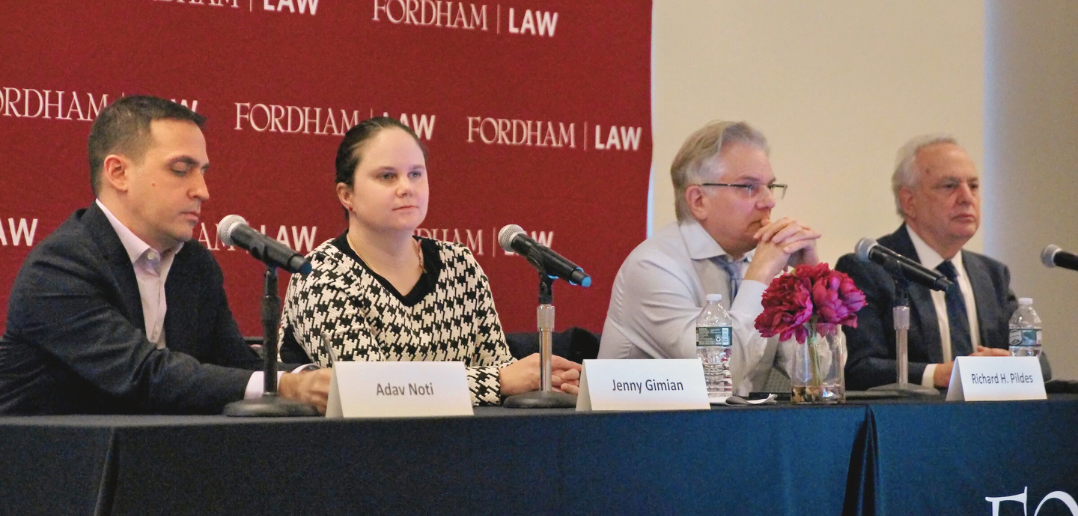As Nov. 5 fast approaches, Fordham Law students and faculty gathered to hear experts discuss an array of risks surrounding the upcoming presidential election, ranging from the denial of the results by candidates and election officials to the potential impact of extreme weather events and even the possibility of violence.
The event— “The 2024 Presidential Election: Are We Ready?”—was sponsored by the Fordham Law Review, the Voting Rights and Democracy Project, the Voting Rights and Democracy Forum, and the Center on National Security. The standing room only event brought together legal experts and advocates who are closely monitoring the 2024 election to debate America’s preparedness for the upcoming presidential vote.
We all understand that there are important legal issues that are being litigated as we sit here, and will probably be litigated after Nov. 5,” said Professor Jerry Goldfeder, director of the Fordham Law School Voting Rights and Democracy Project and senior counsel at Cozen O’Connor, who organized the event.
“I have never seen a pre-election season with this many panels and public events and private events talking about how we’re going to get through this election—and I actually think that’s a good thing. There’s a sort of coming together,” added Professor Karen J. Greenberg, director of the Fordham Law School Center on National Security.
Norman Ornstein, a senior fellow emeritus at the American Enterprise Institute and a contributing editor at The Atlantic, gave a keynote address warning about the chaos that might result from a natural disaster. He called for implementing processes that could ensure election continuity in the event of extreme weather that could disrupt voting in key states like Florida.
“If we had some sort of incident that disrupted an election in parts of the country, what would that mean? And now we have the additional twist of natural disasters becoming more prevalent, more violent,” said Ornstein. As a solution, he suggested an independent panel of non-partisan election officials that would make a decision on how to proceed should there be delays or disruptions caused by extreme weather events.
“We’re in an unprecedented time, a time that is an existential moment for our democracy. It’s great that we have lawyers and others who have stepped up to the plate, but we’re far from out of the woods, whatever happens on Nov. 5,” cautioned Ornstein.
During the first panel, moderated by Goldfeder, Richard H. Pildes, the Sudler Family Professor of Constitutional Law at New York University School of Law, spoke about several election related cases pending in state courts and at the Supreme Court level, and said that more litigation could be expected.
“If the election is close—and the outcome appears to be close in some number of states—I certainly expect a flood of litigation. I expect that either side will do this, depending on where they fall in an election that is this close and the margin is very small,” said Pildes, who is a respected thought leader on democracy issues. “There are limits though, to what can be done or attacked through litigation after the election.”
Speaking on a second panel, Richard L. Hasen, director of the Safeguarding Democracy Project at UCLA School of Law, expressed concern over the potential for isolated acts of violence and the growing election denial movement but noted that this election had the benefit of being watched much more closely than elections past.
“Now everybody knows that we can’t take our peaceful transitions of power for granted,” said Hasen. “Civil society is paying attention and there’s a lot of planning and countermeasures being taken by groups of Democrats, Republicans, independents, coming together, not necessarily agreeing on political questions, but agreeing on the need for free and fair elections.”

